Book 1: Chapter 4- Growing Up
To pass the time while the war was raging across the Aegean, Annabeth began to weave a tapestry to hang on the wall of her bridal chamber. It was the largest and most ambitious piece she had ever worked on, depicting the story of King Minos of Crete, the son of the King of the Gods, who had refused to sacrifice a sacred bull to the God of the Seas. To punish him, the God of the Seas made Minos's wife, Pasiphaë, desire to mate with the bull and conceive a monster called the Minotaur. The Minotaur is hidden away in a labyrinth and every nine years, seven youths and seven maidens from Attica were sacrificed to him. One of the youths was the hero, Theseus, who with the help of Minos's daughter, made his way through the labyrinth and killed the Minotaur. Theseus would go on to unite the oikoi of Attica into the polis of Athens.
House Chase was descended from Theseus while House Jackson was descended from Minos. Annabeth's future marriage to Percy was meant to end the animosity between Athens and Crete which went back generations to the days of Minos and Theseus.
What Annabeth looked forward to the most were the letters that she received from Percy and her father. She loved to read about the war with Persia and about exotic Anatolia.
Upon their arrival in Anatolia, Percy and Jason were sent to train with an amazon named Lupa, who put them through a shortened version of the Spartan agogē. They camped in the hills and slept out in the open with only a single cloak to keep them warm and the bare minimum of food. Lupa encouraged them to steal whatever they needed and wanted from enemy villages and sent them out at night to kill anyone they came across; she only punished them with her whip if they were caught. Annabeth was not sure what horrified her more: having to rob and kill innocent people or sleeping out in the wild like an animal.
Percy wrote about the first person he killed, a boy his own age who had tried to stop him from stealing food from his family's home, and how traumatized he had been by the experience. The trauma only got worse with every life he had to end but he had to seem unaffected or Lupa would punish him for his softness.
Lupa's final test involved an altar piled with cheeses, which looked like the ambrosia of the gods after months of deprivation. The altar was guarded by two soldiers, instructed to guard the cheeses at all cost. Percy was whipped to within an inch of his life and his body was covered in blood but he ate his fill of cheese.
When their training was over, Lupa gave Jason and Percy their shields and the traditional warning of Spartan mothers "either with your shield or on it."
Then the princes were sent to join the Greek Army and serve as hoplites under Gleason of House Hedge, a notoriously tough Spartan commander. Hoplites were foot soldiers who carried a spear and a large bronze shield called a hoplon. Hedge trained them to fight in a formation called a phalanx, which involved using half of your shield to protect yourself and the other half to protect the man next to you. They practiced moving in this formation with changes in direction communicated through music.
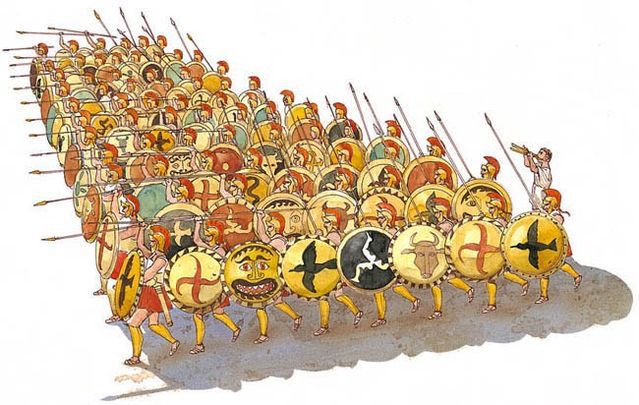
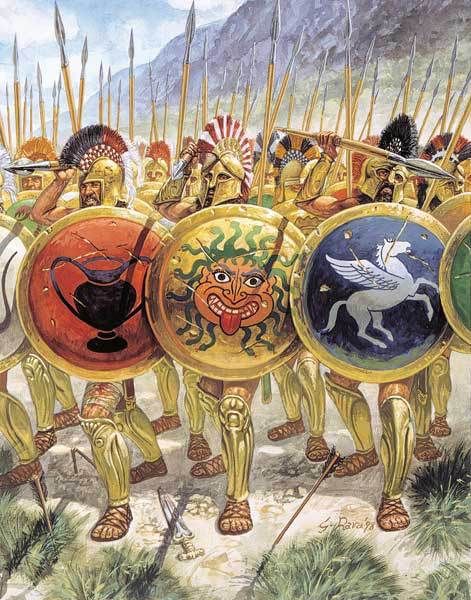
"Listen up cupcakes!" Hedge often shouted at them over the flutes and drums, "Never let your spears fall or your shields drop! Don't let the phalanx fall apart!"
For a Greek hoplite, such things were a dishonor worse than death, which was something to be embraced as eagerly as a lover. Percy joked that the melas zomos (black soup), a revolting mixture of boiled pig's blood and vinegar, was reason enough to die.
Before going into battle, they said prayers and made offerings to the God of Passion and Desire, the son of the Goddess of Love and Beauty and the God of War and Destruction, so that he would inspire them onto a kalos thanatos (beautiful death).
As a child, Annabeth wondered what use a soldier could have for the God of Passion and Desire, but watching King Zeus's behavior towards his wife and the court's slave girls had shown her that there was little difference between the lust for flesh and the lust for blood. The mating of the Goddess of Love and Beauty, and the God of War and Destruction had brought fear and terror into the world but perhaps passion was their most terrible and unpredictable offspring. The Goddess of Love and Beauty had the ability to curb the worst excesses of her mate and offspring and brought good order and harmony to the world, which was why, like a good Athenian, Annabeth prayed to her.
In her turn, Annabeth wrote to Percy about court gossip and what she was reading. Her parents sent her works by the great Athenian philosophers and playwrights such as The Republic by Plato, Politics, and Rhetoric by Aristotle, and Antigone by Sophocles. A troupe of actors came to court and staged a performance of Antigone in the outdoor amphitheater. Annabeth captured the experience by writing it down on Egyptian papyrus with expensive cuddle fish ink. The evening began with choral song and dance and libation offerings to the God of Wine and Revelry. She described the masks and costumes that were worn: the actor playing Antigone wore a mask which transformed him into a beautiful maiden and was dressed in the clothes of a young virgin;

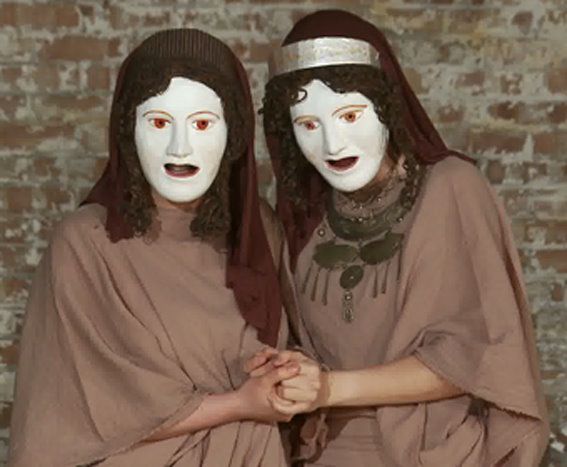
The actor playing Creon was a handsome young man from a poor, peasant background but wore the mask of an ugly grey beard and the rich robes and jewels of a king;
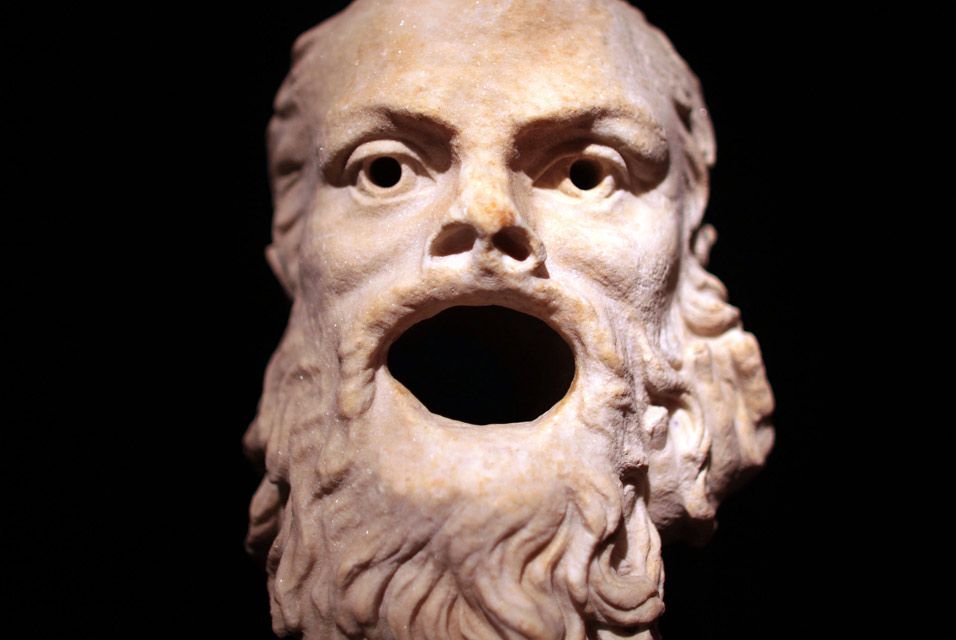
The chorus, the group of actors who observed, commented on, and tried to make sense of the plot-occasionally interrupting it with song and dance, wore white shrouds and the ghostly faces of mourners.
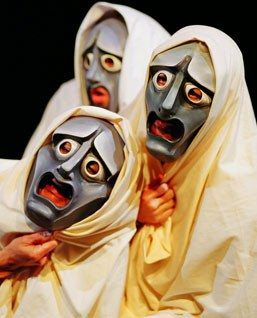
Chiron had his pupils discuss the play the following mourning. He explained that drama was a good way to get people to think about complex moral and political issues. Was Antigone in the right or was it her uncle, King Creon? Was Creon a cruel tyrant for preventing Antigone from burying her rebel brother or simply trying to keep order? Was Antigone a heroic martyr for disobeying her uncle or a disruptive firebrand who threw her life away? Should you break laws you believe to be unjust? Is it more important to obey the laws of men or the laws of the gods?
Every few months, there would be another play to watch and another discussion, along with another parcel of books to read and another section of her tapestry finished.
The letters that came from her father were mostly political in nature, describing the state of the war. The Greek forces were winning but the Persians always came back stronger. They controlled most of the known world and had unlimited resources at their disposal. No matter how long the Greeks could hold out, the Persians could hold out longer.
"All this for an insignificant little sliver of land in Anatolia," pondered Athenaíí, the singer, "The Persians have enough of the world as it is, you think they'd have the decency to leave well enough alone."
Annabeth shared snippets of her father's letters with Athenaíí, who liked to collect news about the war and turn them into songs to sing at court entertainments. She was surprised to learn that the slave could read and write since such an accomplishment was rare for a slave especially a slave girl from Athens, where education for women was viewed with suspicion. Only elite women and hetairai were expected to be learned so they could be companions and advisors to their husbands, lovers, and sons. The rest spent their lives confined to their homes, baking bread and weaving cloth, only venturing out into the world for religious festivals and nights at the theater.
"My father was a paidagogos (a slave who acted as a tutor to their master's children) and he taught me in his spare time," Athenaíí explained, "He always said that since he couldn't shut me up, he might as well give me something intelligent to say."
"He sounds like a remarkable man," Annabeth replied, "You must miss him?"
"From time to time."
"And yet, it's an honor to join the court of the High King of Greece. You must like it here?"
"I'm a slave, My Lady. You might as well ask a dog what it thinks of its kennel."
Athenaíí picked up her lyre and began to strum a tune. She later used the tune in a ballad celebrating Prince Luke and Prince Eros had led their men to victory against a Persian force several times larger than them. The two princes were being hailed as the Hector and Achilles of their generation.
Another slave, a red-headed girl with an elvish, pretty face, entered Annabeth's chambers.
"Yes, Juniper?" Annabeth asked the girl.
"The Queen of Athens, your mother, is here to see you," Juniper answered, "She's waiting in the megaron."
"Thank You, I'll be right there."
Annabeth straightened the skirt of her orange and dark brown striped dress and adjusted the matching peplos to make sure she looked presentable enough to see her mother.
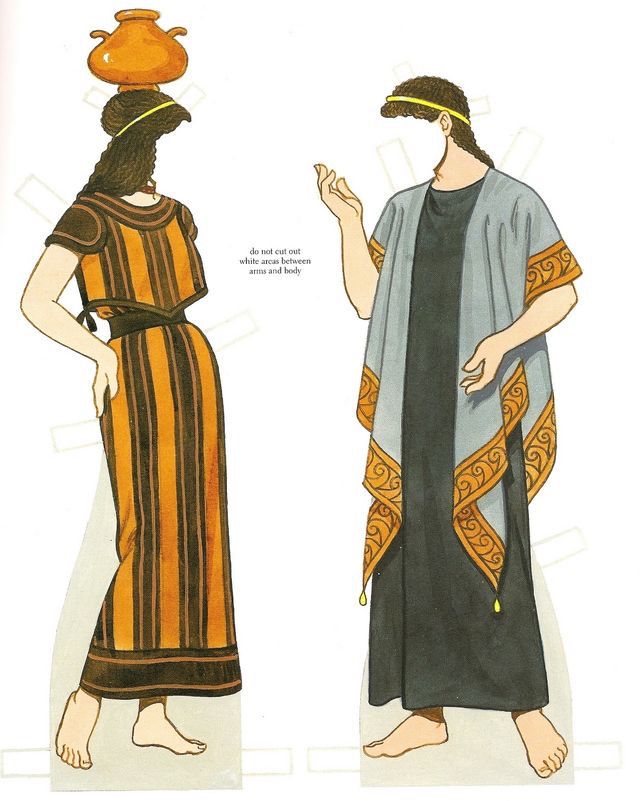
Queen Athena's visit had come as a surprise. If Annabeth had been warned ahead of time, she could have put on something nicer and done more with her hair than just pull it back with a fillet.
Queen Athena herself was dressed for a court appearance in a pale green chiton and veil with a gold crown.
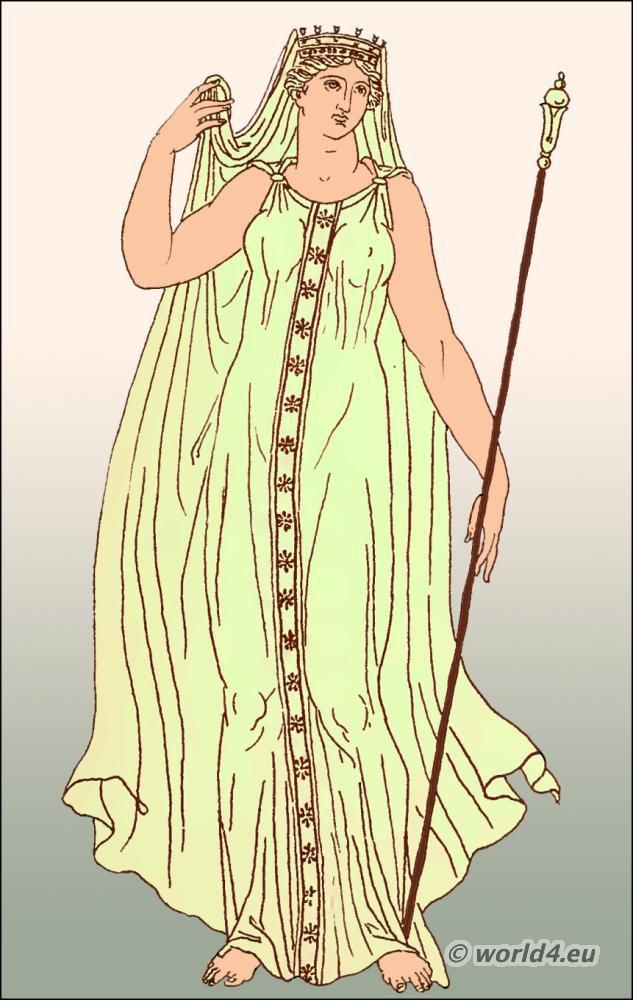
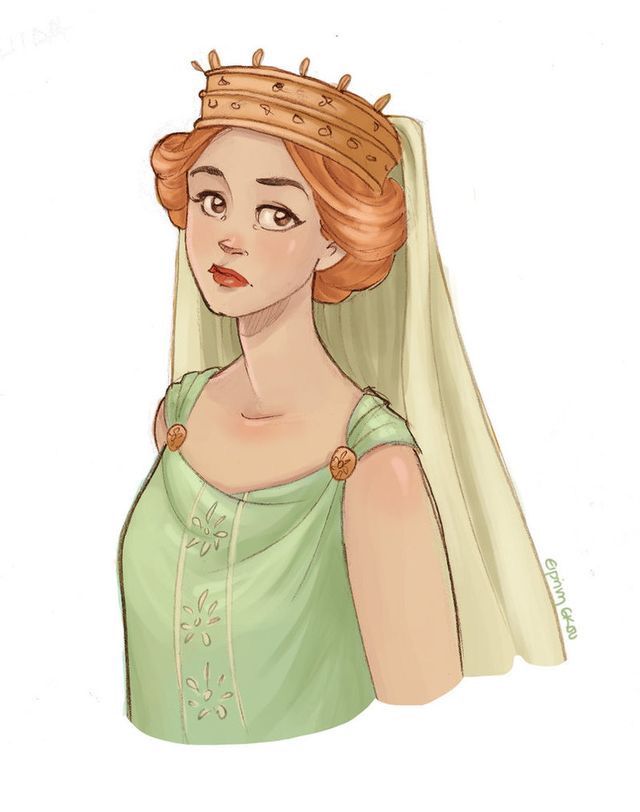
A calm, radiant smile crossed her face.
"My sweet child," she greeted Annabeth, giving her a kiss on her cheek, "That color fillet looks pretty on you."
The fillet which held back Annabeth's hair was a dark blue color that suited her blond hair and grey eyes.
A/N I have blond hair and grayish eyes and I look good in dark blue.
"Percy sent it to me," Annabeth replied.
Percy often sent small presents along with his letters: brightly colored fillets for her hair, pressed flowers, beaded necklaces, and metal bangles; the types of gifts that an ordinary boy would give his sweetheart.
"It's wonderful to see you Mítir, what brings you here?"
"There's an emergency meeting of the boulé and I'm attending in your father's place. We're discussing whether or not to continue with the war or sue the Persians for peace."
"I hope this war will be over soon. It's cost Greece too much already and besides we're winning."
"We're winning but we haven't won yet. If we ask for peace now, then we look weak and nothing will stop the Persians from attacking us again. King Ares says that we must keep fighting a little while longer."
"Of course he would say that."
"This is the first time that King Ares and I have ever agreed. He's a brute who'll look for any reason to keep fighting but he has a point. We've worn the beast down but the death blow is yet to be struck. That's why I'm here to ask for more troupes and supplies."
"The beast is a hydra. If we cut off it's head, then more will grow in its place. We're bleeding ourself dry trying to defeat an enemy who is stronger than us. The people of Athens will be angry if we ask them to send yet more of their coin, crops, and sons."
"They'll be even angrier when the Persians are raping their wives and emasculating their statues."
"Patír is away fightings, do you even miss him?"
Queen Athena put her hands on Annabeth's shoulders.
"We all have to make sacrifices, your father understands that. Don't worry, child, I'm not ready to see Helen the Whore rule through her bastard brat just yet. Now, I'm famished from my trip. Let's have something to eat and talk about something more pleasant than war."
A simple meal consisting of spelt porridge with dried fruit, lentil broth, a salad made from cucumber and radishes, barley bread, figs stuffed with goat cheese and Egyptian beer was brought for them.





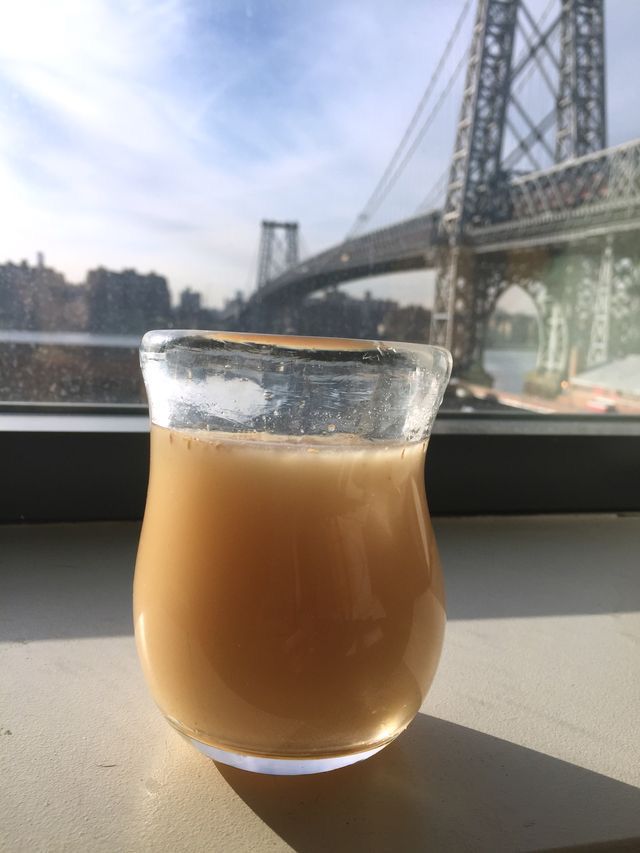
After dining with her mother, Annabeth returned to her chambers to find a letter from Percy on her bed. She broke the seal and deciphered his rather crude and erratic handwriting:
"My Dear Wise Girl," It began, "Tomorrow, there is to be a battle which may finish this war once and for all. We made our offerings to the God of Passion and Desire but instead of making me want a beautiful death in battle, the god sends me thoughts of you. All I can think about is staying alive so I can come home and make you my wife. I've always loved you Annabeth and I don't want to go into battle without you knowing this..."
Annabeth's face felt flushed and hot when she read this. She did not know how to take the news that Percy loved her. The thought that someone was in love with her was unfamiliar and overwhelming.
To call herself down, she went to work on her loom but thoughts of Percy distracted her.
A verse by the poetess Sappho came to her mind as she continued her tapestry which captured how she felt: "Sweet mother, I cannot weave. The slender Goddess of Love and Beauty has overwhelmed me with longing for a boy."
Bạn đang đọc truyện trên: Truyen247.Pro